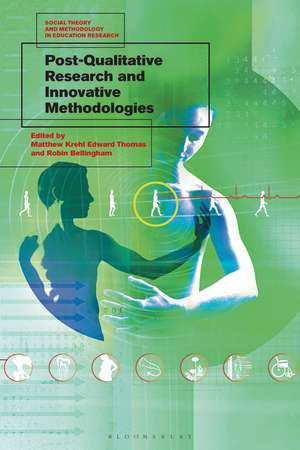Post-Qualitative Research and Innovative Methodologies: Social Theory and Methodology in Education Research
Editat de Matthew K. E. Thomas, Robin Bellinghamen Limba Engleză Paperback – 20 oct 2021
| Toate formatele și edițiile | Preț | Express |
|---|---|---|
| Paperback (1) | 217.17 lei 6-8 săpt. | +69.85 lei 5-11 zile |
| Bloomsbury Publishing – 20 oct 2021 | 217.17 lei 6-8 săpt. | +69.85 lei 5-11 zile |
| Hardback (1) | 656.39 lei 6-8 săpt. | |
| Bloomsbury Publishing – 29 apr 2020 | 656.39 lei 6-8 săpt. |
Preț: 217.17 lei
Preț vechi: 274.64 lei
-21% Nou
Puncte Express: 326
Preț estimativ în valută:
41.57€ • 45.17$ • 34.94£
41.57€ • 45.17$ • 34.94£
Carte tipărită la comandă
Livrare economică 21 aprilie-05 mai
Livrare express 15-21 martie pentru 79.84 lei
Preluare comenzi: 021 569.72.76
Specificații
ISBN-13: 9781350215146
ISBN-10: 1350215147
Pagini: 232
Dimensiuni: 156 x 234 x 17 mm
Greutate: 0.32 kg
Editura: Bloomsbury Publishing
Colecția Bloomsbury Academic
Seria Social Theory and Methodology in Education Research
Locul publicării:London, United Kingdom
ISBN-10: 1350215147
Pagini: 232
Dimensiuni: 156 x 234 x 17 mm
Greutate: 0.32 kg
Editura: Bloomsbury Publishing
Colecția Bloomsbury Academic
Seria Social Theory and Methodology in Education Research
Locul publicării:London, United Kingdom
Caracteristici
Future oriented, innovative, challenging thinking about education research, what it is and what it can be and can do now and in the future
Notă biografică
Matthew Krehl Edward Thomas is Senior Lecturer in Education at Deakin University, Australia. Robin Bellingham is Lecturer in Education, Pedagogy and Curriculum at Deakin University, Australia.
Cuprins
Series Preface, Mark Murphy Foreword, Julianne Moss1. The Vitality of Theory in Research Innovation, Matthew Krehl Edward Thomas and Robin Bellingham Part I: Disruption, Subjectivity and Agency 2. Postproductive Methods: Researching Modes of Relationality and Affect Worlds through Participatory Video with Youth, Laura Trafí-Prats and Rachel Fendler 3. Experimental Critical Qualitative Inquiry: Disrupting Methodologies, Resisting Subjects, Travis M. Marn and Jennifer R. Wolgemuth4. Troubling Binaries: Gendering Research in Environmental Education, Catherine Hart and Annette Gough5. The Shame of Participation: Rethinking the Ontology of Participation with a Stutter, Eve MayesPart II: Frontiers: Possibility, Timespace and Materiality6. Posthumanist Poetics and the Transcorporeal, Hypercorporeal Chronotope, Robin Bellingham7. Who is in My Office and Which Century/ies Are We In? A Pedagogical Encounter, Mary Dixon 8. Disturbance and Intensive Methodology in Capitalist Ruins, Jesse Bazzul9. Transversalities in Education Research: Using Heterotopias to Theorize Spaces of Crises and Deviation, Marguerite Jones and Jennifer Charteris Part III: Entanglements and Innovations: Method and Theory10. Swarms and Murmurations, Matthew Thomas 11. Post-Anthropocene Imaginings: Speculative thought, Diffractive Play and Women on the Edge of Time, Chessa Adsit-Morris and Noel Gough 12. Replete sensations of the Refrain: Sound, Action and Materiality in Agentic Posthuman Assemblages, Jennifer Charteris and Marguerite JonesIndex
Recenzii
This important new collection has that 'forward tilt' described by the editors, of elaborating new concepts and new possibilities for thought and action, while being anchored in the ethics and the affects of specific research projects and encounters. It is a lively and serious contribution to a field that, thankfully, still has no fixed boundaries.
Matthew Thomas and Robin Bellingham have assembled a book we need in this moment, one that moves beyond the pronouncements of post-qualitative, posthumanist, and agential realism as departures from what was and takes the step of materially exploring what social inquiry can be. It does so with an honesty about the slippages, challenges, and struggles of putting new theory to work that will stimulate great conversations in methodology classes and conferences for years to come.
This provoking volume is one of the Bloomsbury Social Theory and Methodology in Education Research Series.The book provides an opportunity to question assumptions upon which research and society are built. The editors and authors are to be congratulated for developing and presenting a book that takes us to see research with different eyes, to imagine new forms and terms, to be intrigued by the intersecting of humanity with the natural world, and to envisage further changes that are moving into the world of Artificial Intelligence.
Matthew Thomas and Robin Bellingham have assembled a book we need in this moment, one that moves beyond the pronouncements of post-qualitative, posthumanist, and agential realism as departures from what was and takes the step of materially exploring what social inquiry can be. It does so with an honesty about the slippages, challenges, and struggles of putting new theory to work that will stimulate great conversations in methodology classes and conferences for years to come.
This provoking volume is one of the Bloomsbury Social Theory and Methodology in Education Research Series.The book provides an opportunity to question assumptions upon which research and society are built. The editors and authors are to be congratulated for developing and presenting a book that takes us to see research with different eyes, to imagine new forms and terms, to be intrigued by the intersecting of humanity with the natural world, and to envisage further changes that are moving into the world of Artificial Intelligence.








